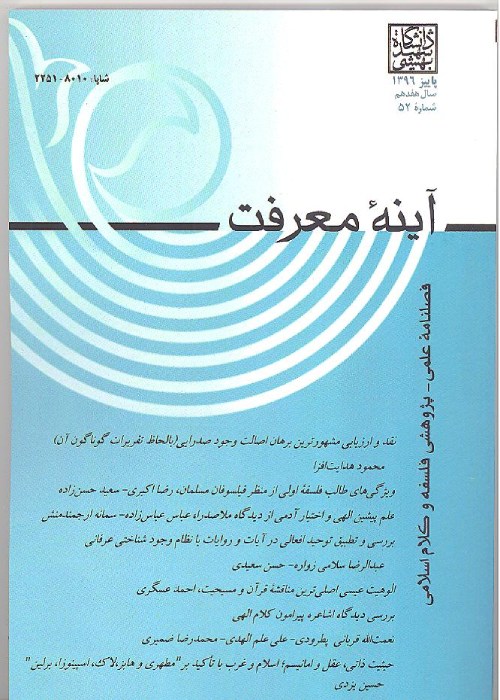Indeterminism in the Shīʹîte Îmāmī Kâlām and its Educational Role
One of the long-standing Kâlāmī problems in Islamic thought has been the problem of “predestination and freewill”, which has occupied the minds of many thinkers. This problem has two sides. On the one hand, a human being has freewill. This means that a human being, by his will and reason, chooses either the path of salvation and prosperity, or the path of wretchedness and destruction, and becomes deserving of reward or deserving of punishment. On the other hand, a human being is completely lake of any freewill in some matters such as determining his parents, the place and time of his birth, and so on. In the Holy Qur’an both these two sides of the problem have been referred to. There are verses in the Qur’an that refer to the human freewill, such as the verse: “SAY: ‘Truth comes from your Lord. Let anyone who wishes to, believe, and let anyone who wishes to, disbelieve.’” (18:29); in which the Qur’an speaks of anyone’s voluntary believing or disbelieving in Truth; or the verse: “We have guided him [= the man] along the [right] path, whether he is thankful or thankless” (31:3); in which the Qur’an speaks of the Lord’s guidance, and points out that people have a state of gratitude towards the Lord’s guidance, which means the “acceptance”, or a state of ingratitude to it, which means the “rejection”. At the same time, there are verses in the Qur’an that refer to the concept of “predestination”, such as the verse: “Anyone whom God guides, remains guided; while anyone He lets go astray will never find any patron to set him straight” (18:17); in which the Qur’an refers to divine guidance and going astray; or the verse: “God guides anyone He wishes to a Straight Road” (2:213); in which the Qur’an speaks of God’s Guidance to the Straight Road for whomever He wants. Âsh'ârītes insist on predestination by appealing to some Qur’anic verses, without paying attention to other verses of the Qur’an and the premises needed for correct understanding of the Qur’an. Mû'tâzîlītes, by appealing to some Qur’anic verses about the human will and matters such as God’s commandments and prohibitions, or His rewards and punishments, know human freewill as certain. This paper aims at answering, by a descriptive-analytical method, two main questions: (1) according to the Shīʹîte Îmāmī Kâlām, is a human being a free being or a predestined being? and (2) what are the educational effects of considering a human being as a free being or a predestined being?The results of this paper are as follows: in explaining the incompatibility of “freedom of the infidels with their inherent wretchedness”, it was found out that attributing wretchedness to the nature of infidels contradicts both with freewill and with predestination. Its contradiction with freewill is obvious, but the relation of wretchedness with the nature of infidels contradicts with the deterministic view that God is the complete cause of all things, because according to this view, the nature of infidels is considered as the complete cause of their wretchedness. Regarding the objection of “the freewill and fate (qâḍā) and destiny (qâdâr)”, it was clarified that the act to which God’s fate belongs, God’s fate belongs to that act with the limits of that act, and one of the limits of that act is that it must issue from its agent freely. Also, it was found out that the fate and destiny contradict with considering them as the complete cause of human acts. About the objection of “the freewill and the order of causality”, it was clarified that not only the order of causality is not incompatible with human freewill, but also doing the actions needs many causes, one of which is causality. Moreover, about the objection of “the freewill and generality of creation”, it was mentioned that attributing the badness to the essences of things is not correct, but badness is due to the factors outside of the essences of things. In other words, a bad act is a permissible act that has not been performed through its legal channels. Besides, with regard to the objection of “the freewill and Divine Providence”, it was found out that the Divine Providence is an existential-legislative providence; i.e., God, by His existential providence, has willed that a human being be free, and the final cause of doing actions is human will. It should be noted that, based on the Shīʹîte Îmāmī Kâlām, sending the Prophets has had an important role in educating the human beings, and faith in the Prophets has given rise to the righteous action. Also, it should be mentioned that the tradition of trial and affliction is closely related to educating the human beings, and human beings are afflicted by pleasure and pain in order to grow. Besides, we must know that responsibility is one of the essential elements in human growth and upbringing, and to the extent that a human being pays attention to his responsibility, he becomes resolute in training and purifying his soul. These show that belief in human freewill plays a central role in educating a human being, and, therefore, the key to purifying the soul is to strengthen the will.
- حق عضویت دریافتی صرف حمایت از نشریات عضو و نگهداری، تکمیل و توسعه مگیران میشود.
- پرداخت حق اشتراک و دانلود مقالات اجازه بازنشر آن در سایر رسانههای چاپی و دیجیتال را به کاربر نمیدهد.


